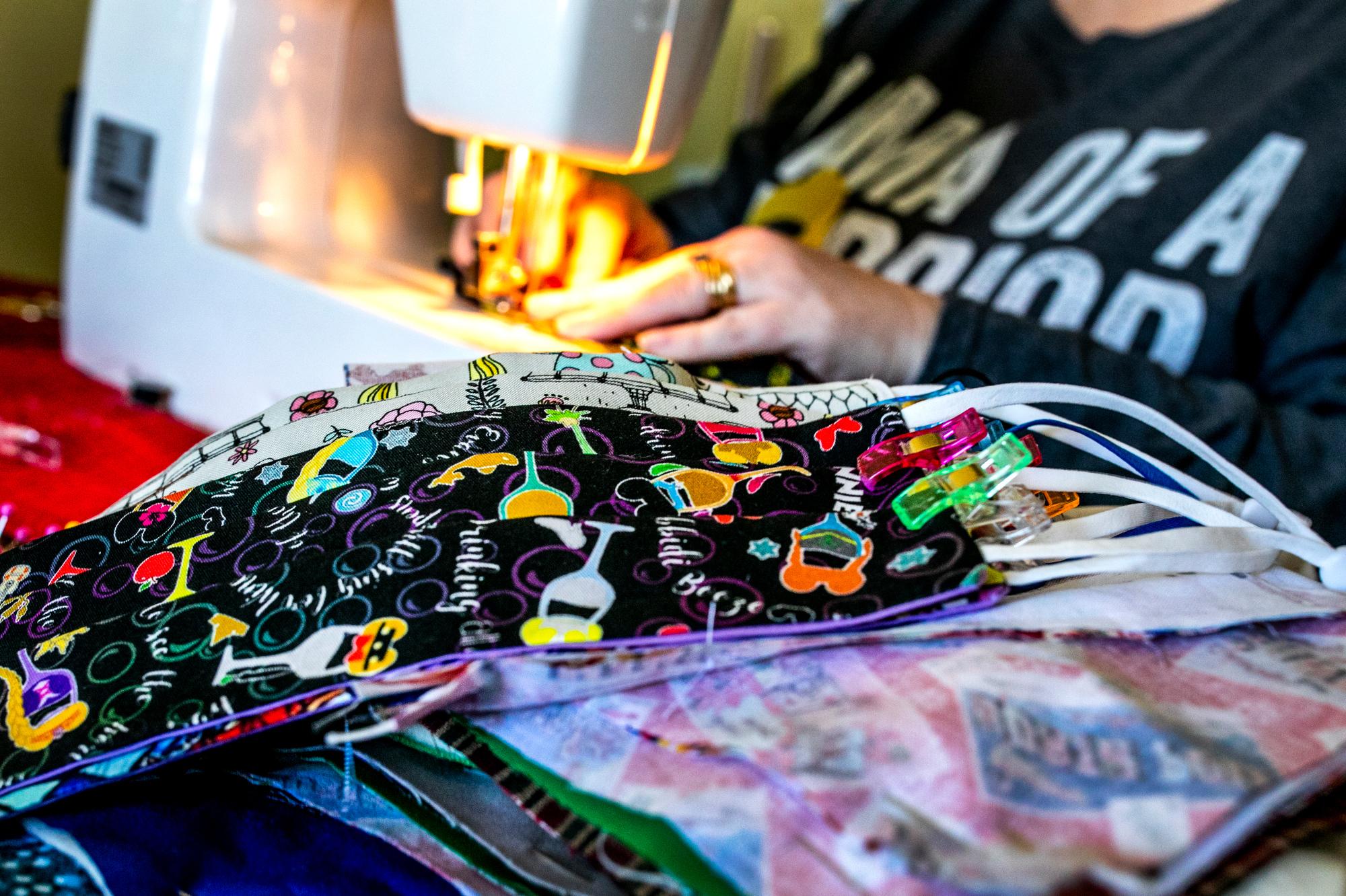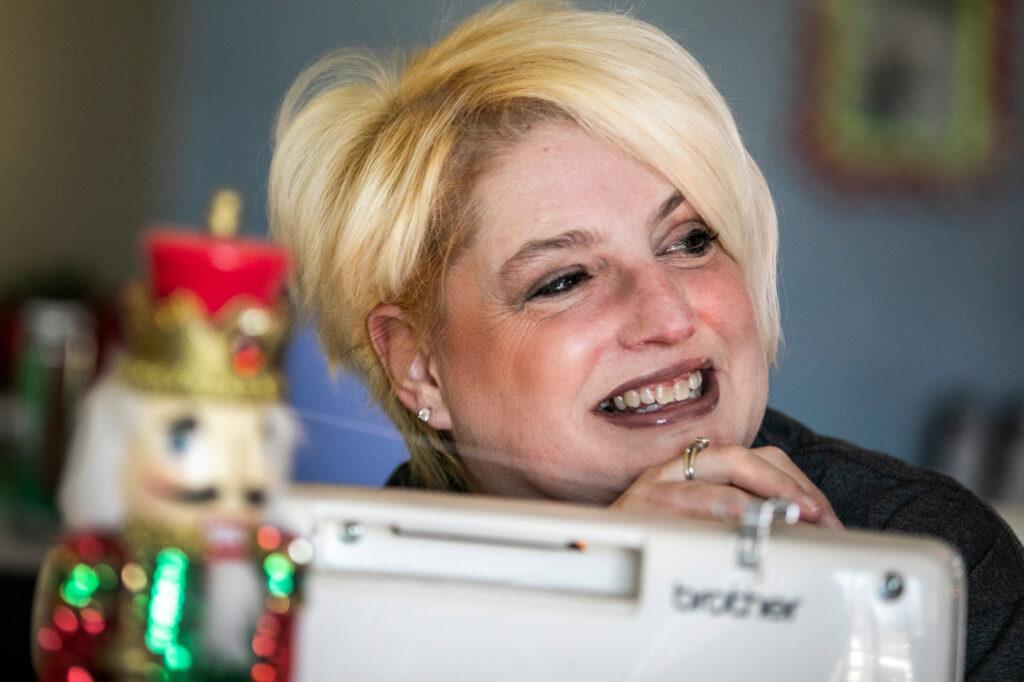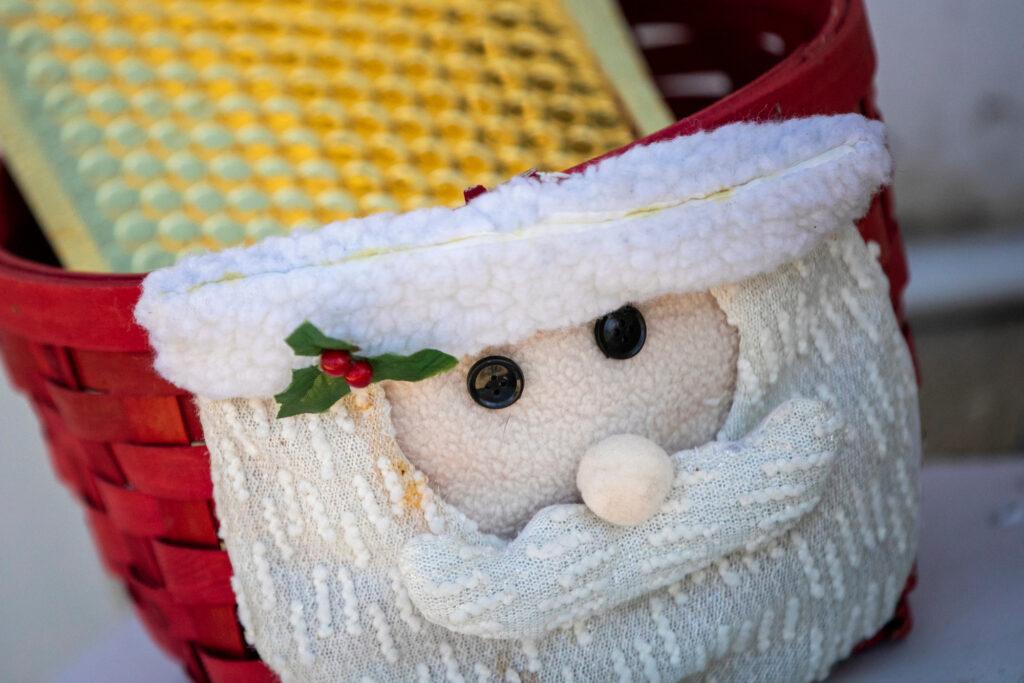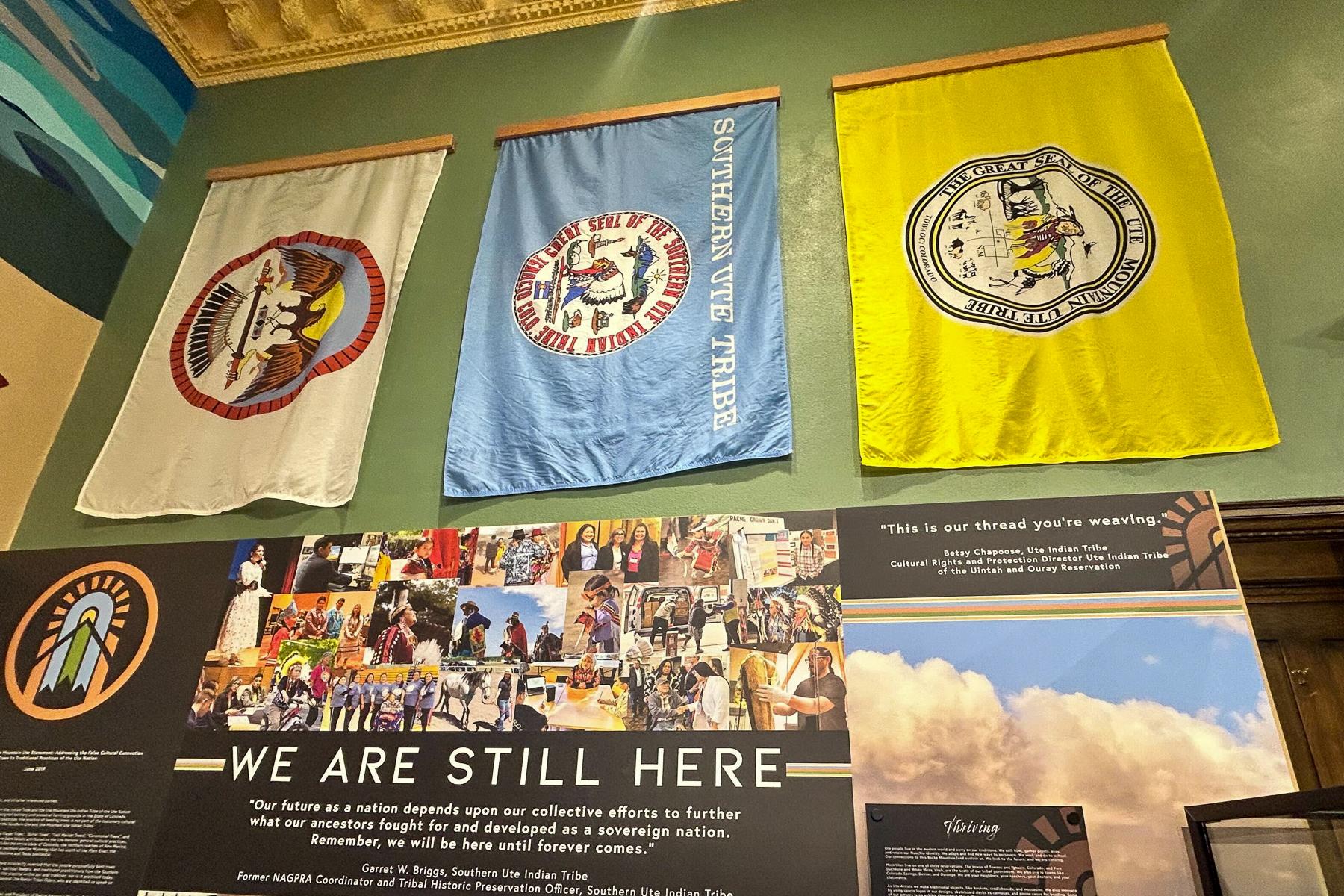
Aurora resident Jennifer Belo learned to cross-stitch from her future mother-in-law when her then-fiancé went to Marine Corps boot camp. Since then, she’s turned her crafting skills into a business — building an Etsy store that sells handmade items and commissioned works.
For 2020, she had envisioned a business plan and wanted to sell her wares at craft shows. Then the pandemic changed everything. She probably didn’t know that the skills she used to pass the time early in her marriage would become so vital to her family in the early days of the pandemic.
“My oldest daughter has cancer, so I needed to make sure that she was protected and trying to find masks to purchase at that point in time was almost impossible,” Belo said. “So, I just kind of did a little research online and found an amazing website that had a pattern. I thought, well, let me try this.”
Belo’s masks tend to be bright and full of pop culture characters. Right now, her shop carries masks featuring Baby Yoda, Doctor Who, The Wicked Witch from “The Wizard of Oz,” and for the holidays, you can even snag a Grinch or Frosty the Snowman pattern while supplies last. She said running her Etsy shop has become her full-time job after her duties as a stay-at-home mom.

Belo’s story resembles the stories of many other crafters across the state.
Since March, each mask maker has survived the ebb and flow of demand as well as supply shortages. Some have had to close their shops intermittently to catch up with orders or to take a break. Nine months into the pandemic, each mask maker has sold thousands of masks. A few crafters have even sold an upwards of over 3,000 through online and local stores.
But instead of dollar signs, many instead saw a need for masks in their family or communities. Many taught themselves how to make the masks out of necessity — something many of them had never done before.
Chris Joondeph in Englewood found himself in a similar situation when his mother caught the coronavirus in mid-March. Even his father, a doctor, was running out of masks at his practice.
“My mom has a sewing machine. Maybe I could find some fabric in the basement and maybe make something,” Joondeph said. “I made a couple of these Denver Broncos masks and my dad wore one to work and some people were interested in buying it.”
That interest led Joondeph to open his own Etsy shop at the start of the pandemic. It turned into an unexpected job for him.
“It was definitely not the job I thought I was going to have after business school. I kind of got into action and realized that even during this pandemic and during rough times for me on my family side, but also financially and just not having any jobs to look forward to, there are opportunities out there if you can kind of think creatively and discover them.”
Like Joondeph, Julie Whitney, a substitute teacher and crafter in Fort Collins, said she took up sewing just to make masks.
“When this pandemic hit, Etsy started sending out these emails saying the country is in dire need of masks. If you can make masks, please do it. I’d never sewn before,” she said. “When I was getting these emails, I thought, ‘I’m a crafty person, I can learn how to sew.’”
Another experienced Etsy vendor, Meredith Macherey in Aurora, said she wasn’t originally making masks but switched over when the need for more became apparent.
“My neighbor, who is a head nurse at a freestanding ER, called me and she said, ‘Are you making masks?’ And she was in a total panic,” Macherey said. “I said, ‘No,’ and then she said, ‘We have one day left of PPE.’ I was so upset for all these nurses who are working such long hours in such stressful circumstances to not have protective equipment. So that night I said, ‘I'm going to learn how to make masks.’”
Through trial and error, these first-time mask makers eventually found the patterns that worked — and an eager audience. It was a gold rush on masks — but instead of profits, many makers just wanted to help people.
To keep up with the new demand, many crafters kept intense hours like Whitney. “I worked from, and I'm not exaggerating, from 5:00 a.m. to 9:00 p.m. every day for two months,” Whitney said.
“It was actually kind of funny because my husband wasn't able to go out and he works a lot of hours, but all of a sudden I am super busy and he is at home,” she said. “So he was running to the post office for me three times a day.”
Belo said she also struggled.
“I could not keep up with the demand,” she said. “The orders just kept coming in faster and faster. Those first couple of weeks I would say I was probably up until maybe 2 in the morning cutting patterns and pinning everything together. And then the next day I would just sew until my fingers hurt.”

Some mask makers like Patti Kryzanowski, a biologist and crafter in Colorado Springs, took the challenge head-on. She joked that being a crafter has its drawbacks.
“That is the bane of quilters, that we have the tendency to hoard fabric,” she said.
Some of the fabrics mask makers use reflect the spirit of Colorado. Some feature nature or hiking themes. Others make masks to pay homage to sports teams, like the Broncos or Nuggets. There’s pawprints for pet lovers and various versions of our state flag. The masks Coloradoans wear are as diverse as the residents of the state itself. There are masks for every imaginable hobby. Masks that tie on differently for people with disabilities. Masks for the deaf or hard of hearing. They come in every imaginable color and shape to fit a variety of bodies.
Kryzonowski looked for what Colorado still has to offer in the depths of the pandemic as inspiration.
“We had the opportunity, unlike a lot of people, to be outside and enjoy being outside. Even when we were on lockdown, we were still able to go hiking,” she said. “I just think Coloradans are proud of where they live.”
Macherey believes that making unique masks could encourage people to wear them. “It was nice to be able to help out in this area because masks help a lot. And I feel like if we can make them at least an interesting fun pattern, make them attractive, that might provide a little bit more incentive for people to wear them.”
Some said the unexpected workload has helped them through the pandemic. For Whitney, mask making gives her a sense of purpose.
“Before I started making the masks, I was really depressed. I would just sit and I would read like, what am I going to do?” she said.
A number of the mask makers who talked to Colorado Public Radio have given to charities or their communities from their profits. Joondeph donated to Porter Adventist Hospital in Denver, where his mother was treated for COVID-19. Whitney gave to Books for Kids, a literacy nonprofit that provides libraries and resources to preschool children. Kryzonowski donated masks to health care workers and bought groceries for neighbors who lost their jobs. Macherey gave her neighbor, the ER nurse, 50 masks the next morning to take to work. For many of the crafters, like Aurora resident Belo, the feeling that they are doing good for people far outweighed any profit they made.
“I felt really good because I was getting so many compliments on how well the mask was made and people would tell me, it's my favorite mask to wear when I go out,” Belo said. “I've gotten to some points where it's like, gosh, I just don't want to do this anymore, but then I would get an email or a text from someone that says, ‘Gosh, I really loved what you made. I love your patterns and I love your designs.’ That's what keeps me going.”
Belo said she’s taken some of her profits and donated them to the Morgan Adams Foundation to support pediatric cancer research. She also plans to use the proceeds to help pay for her daughter’s cancer medication, and she just might treat her family to a dinner or two.









